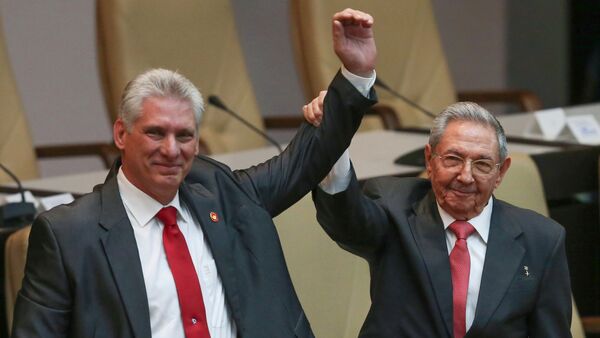Sputnik: For the first time since the revolution in Cuba the leader of the nation is not a Castro. How significant is this particular fact?
Dr. Helen Yaffe: I think there’re two ways to approach this question. The first is symbolically. The fact that the Cuban revolution has now proven some resilience and sustainability by outliving the Castros in a sense is very important. Miguel Diaz-Canel, who was just elected as the new President of the Council of State, demonstrates this fact, because he was born after the revolution. He is 57 and the revolution is 59, it’ll be 60 on the 1st of January next year. I think this is an intelligent, strategic decision to take someone who was born and educated entirely by the system. On the other hand, there’s clearly going to be continuity in the Revolutionary Government and in the process of socialist construction. And again Diaz-Canel made that absolutely clear with his speech in the National Assembly.
Sputnik: What do we know exactly about Miguel Diaz-Canel? As you’ve said, he’s a product of the system, but anything particularly interesting and striking there?
Dr. Helen Yaffe: Some information is starting to come out. He’s had very low profile in the last few years, really since he’s been in the position of First Vice-President of the Council of State, which he'd held for several years. There are stories emerging of the character of his leadership of the Cuban Communist Party in Las Vilas province. He was seen as very in touch, very connected with the local people, he was very concerned to learn about the real problems in the area and get them addressed. He was very a demanding but very personable person – knows people by name and so on. I think that is one aspect of him that outside of Cuba we haven’t really seen yet. He hasn’t really had a high profile in recent years; that may have been a strategic decision, but one has to see how his style flourishes now that he’s in this new position.
Sputnik: Perhaps you could narrow down just a few of the most important challenges that the newly elected leader is going too face now?
Dr. Helen Yaffe: There are going to be economic challenges, but in a socialist society, of course, the economy can’t be separated from politics and the social question. So the question of increasing productivity and efficiency in state enterprises, unification of the dual currency system – this is becoming an increasingly urgent need, it’s becoming an obstacle to productivity and also to foreign investments, and also handling the Trump administration in the US.
Sputnik: How different would the relations between Cuba and the US develop moving forward? Do you think that this end of the Castro era could also signify the end of the embargo era perhaps as well?
Dr. Helen Yaffe: I think that could have been on the cards under Obama or a similar regime in the US. The fact that Trump has been flip-flopping on the Cuba question, first being in favor of rapprochement and even sending his own business representatives to Cuba before rapprochement happened, well before he was even a candidate in the elections. Trump has taking a very hostile line; he's strengthened elements of the US embargo which were loosened by Obama. It’s not entirely a reversal, but he’s also up to the sort of hostility of the rhetoric and he’s really allowing his Cuba policy to be dictated by a very small number of a Cuban-American politicians who are utterly hostile to the Cuban system.
The views and opinions expressed in this article are those of the speaker and do not necessarily reflect those of Sputnik.

